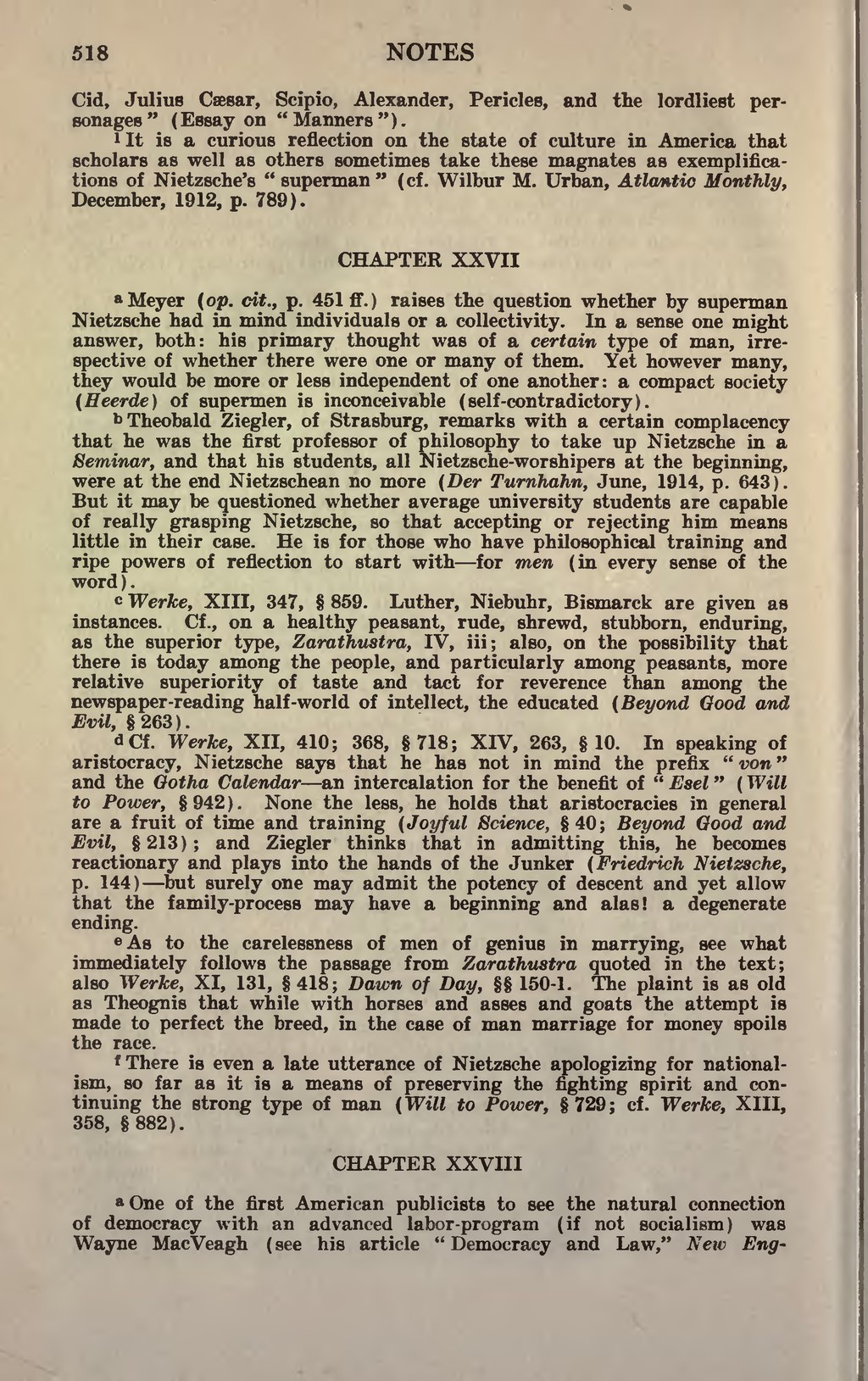Cid, Julius Cæsar, Scipio, Alexander, Pericles, and the lordliest personages" (Essay on "Manners").
l It is a curious reflection on the state of culture in America that scholars as well as others sometimes take these magnates as exemplifications of Nietzsche's "superman" (cf . Wilbur M. Urban, Atlantic Monthly, December, 1912, p. 789).
CHAPTER XXVII
a Meyer (op. cit., p. 451 ff.) raises the question whether by superman Nietzsche had in mind individuals or a collectivity. In a sense one might answer, both: his primary thought was of a certain type of man, irrespective of whether there were one or many of them. Yet however many, they would be more or less independent of one another: a compact society (Heerde) of supermen is inconceivable (self-contradictory).
b Theobald Ziegler, of Strasburg, remarks with a certain complacency that he was the first professor of philosophy to take up Nietzsche in a Seminar, and that his students, all Nietzsche-worshipers at the beginning, were at the end Nietzschean no more (Der Turnhahn, June, 1914, p. 643). But it may be questioned whether average university students are capable of really grasping Nietzsche, so that accepting or rejecting him means little in their case. He is for those who have philosophical training and ripe powers of reflection to start with—for men (in every sense of the word).
c Werke, XIII, 347, § 859. Luther, Niebuhr, Bismarck are given as instances. Cf., on a healthy peasant, rude, shrewd, stubborn, enduring, as the superior type, Zarathustra, IV, iii; also, on the possibility that there is today among the people, and particularly among peasants, more relative superiority of taste and tact for reverence than among the newspaper-reading half-world of intellect, the educated (Beyond Good and Evil, § 263).
d Cf. Werke, XII, 410; 368, § 718; XIV, 263, § 10. In speaking of aristocracy, Nietzsche says that he has not in mind the prefix "von" and the Gotha Calendar—an intercalation for the benefit of "Esel" (Will to Power, § 942). None the less, he holds that aristocracies in general are a fruit of time and training (Joyful Science, § 40; Beyond Good and Evil, § 213); and Ziegler thinks that in admitting this, he becomes reactionary and plays into the hands of the Junker (Friedrich Nietzsche, p. 144)—but surely one may admit the potency of descent and yet allow that the family-process may have a beginning and alas! a degenerate ending.
e As to the carelessness of men of genius in marrying, see what immediately follows the passage from Zarathustra quoted in the text; also Werke, XI, 131, § 418; Dawn of Day, §§ 150-1. The plaint is as old as Theognis that while with horses and asses and goats the attempt is made to perfect the breed, in the case of man marriage for money spoils the race.
f There is even a late utterance of Nietzsche apologizing for nationalism, so far as it is a means of preserving the fighting spirit and continuing the strong type of man (Will to Power, § 729; cf . Werke, XIII, 358, § 882).
CHAPTER XXVIII
a One of the first American publicists to see the natural connection of democracy with an advanced labor-program (if not socialism) was Wayne MacVeagh (see his article "Democracy and Law," New Eng-
